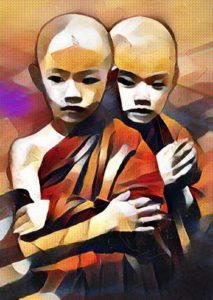2.3 (13) The Stick (Daṇḍa Sutta)
Thus has it been made known. At one time the Blessed One was residing near Sāvatthī, at the Jeta Grove in Anāthapiṇḍika’s Park. Nearby a large group of boys were beating a snake with a stick. Now the Lord, having dressed in his robe and outer cloak while carrying his alms-bowl, was walking towards Sāvatthī during the forenoon when he encountered those boys between Sávatthì and the Jeta Wood beating that snake with a stick.
Thereupon realizing the significance of this action, uttered the following verse:
Anyone who, seeking happiness for himself, inflicts injury with a stick,
For the sake of selfish gratification,
Will not obtain happiness after death.
Whereas one, refraining from inflicting injury as a means for happiness,
Thus securing the wellbeing and happiness of a sentient creature,
Will self-secure happiness for oneself upon passing-away.
Trying to procure happiness and satisfaction out of injuring another creature and out of sheer pleasure and excitement, will surely self-inflict upon oneself a heavy karmic retribution.
2.4 (14) Veneration (Sakkāra Sutta)
Thus has it been made known. At one time the Blessed One was residing near Sāvatthī, at the Jeta Grove in Anāthapiṇḍika’s Park. It came to pass that during those times the Blessed One was honored, worshiped, venerated, and was the recipient of robes, food, lodging, and medicines. As a result, the community of monks were likewise honored, worshiped, venerated, and were the recipients of robes, food, lodging, and medicines. But now then, the wanderers of other sects were greatly displeased for all the attention and goodwill bestowed upon the Blessed One and his disciples. As a consequence, they reviled and rebuked them whether they encountered them in the forest or in villages and hurled upon them most abusive and insulting language.
While the assembly of monks were gathered with the Blessed One, they spoke of how highly their own order was greatly respected and venerated while any wandering sects did not have the same satisfaction. They recounted to the Blessed One how they were being harassed and harangued by those wandering ones who lambasted them with incessant insults and abusive tongues.
In measured response, the Blessed One uttered the following inspired verse:
Whether being affected by admiration or disdain in the forest or village,
Never ascribe any of it to oneself or another.
All encounters incur dukkha because of the nature of the base elements,
When all contacts are rendered null when they are disbanded,
Who is there to harm whoever?
base elements: this is in reference to the five skandhas. When allowed to reign unchecked they incur the following:
upadhi: (T. rdzas; C. yi; J. e; K. ŭi 依). In Sanskrit and Pāli, the “substratum” of rebirth or the “bonds” that bind one to continued existence in SAṂSĀRA. Upadhi is typically equated either with the five aggregates (SKANDHA) or with the afflictions (KLEŚA) of sensuality (RĀGA), ill will (DVEṢA), and delusion (MOHA). Less specifically, any of the ties that bind one to the world, whether family, possessions, or property are described as upadhi. [Buswell Jr., Robert E.; Donald S., Jr. Lopez. The Princeton Dictionary of Buddhism (Kindle Locations 70757-70764). Princeton University Press. Kindle Edition.]
This is the attachment that was afflicting the disciples of the Buddha. So caught up were they in their own self-worth and inflated status, they indeed felt themselves to be superior and were deeply annoyed when other wandering sects refused to pay them homage. The Buddha reminded them that when the five skandhas themselves are disbanded, who is left to feel either honored or disgraced?

